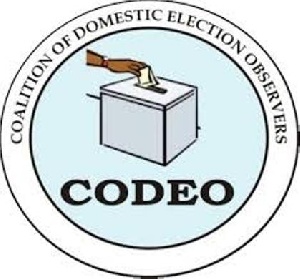 This series of public engagement form part of CODEO
This series of public engagement form part of CODEO
The Coalition of Domestic Election Observers (CODEO) will begin a nationwide engagement on the phenomenon of political party vigilantism this Friday, June 23, 2017.
This series of public engagement form part of CODEO’s post-2016 election activities, and is made possible with the generous support of the American people through USAID.
The nationwide engagement is in recognition of the dangers that political party vigilante groups pose to the country’s electoral politics and democratic development. The engagements, to be held in all ten regional capitals, will take the form of round table discussions, focus group discussion, and special briefings with the media.
It will bring together all relevant stakeholders, particularly the security agencies, political parties, peace promotion institutions, and civil society, among others, to address this growing menace in the country’s democracy.
The engagements will be used as an avenue to stimulate and sustain discussions on the menacing effects of vigilante group activities in the politics of Ghana. The partner institutions will also use the outcomes of the engagements to conduct civic and voter education against the phenomenon, as well as advocacy to disband party vigilantism in Ghana’s electoral politics.
Some of the interventions expected from these public engagements include the development of a comprehensive advocacy policy recommendation for all stakeholders to implement and a campaign to end vigilantism, among others.
CODEO, a coalition dedicated to promoting free, fair, transparent and credible elections through nonpartisan election observation, is made up of 42 professional, faith-based and civil society organisations.
It has been independently and credibly observing elections in Ghana since 2000. CODEO’s post-election activities are made possible with the generous support of the American people through USAID.